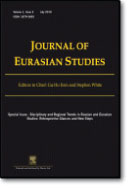A Limited Toolbox

Explaining the Constraints on Russia's Foreign Energy Policy
Autor(en): Robert Orttung, Indra Overland
Journaltitel: Journal of Eurasian Studies
Reviewed:
Band: 1
Ausgabe: 2
Verlag(e): Elsevier
Publikationsjahr: 2010
